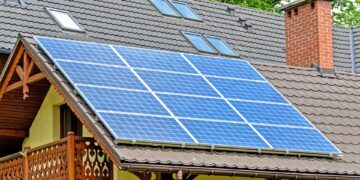Energizing the Future: The Power and Potential of Renewable Energy
Renewable energy is a hot topic in today’s world as we strive to reduce our carbon footprint and transition to a more sustainable way of living. The power and potential of renewable energy are immense, offering a clean and abundant source of energy that can help us combat climate change and secure a brighter future for generations to come. In this article, we will explore the various forms of renewable energy, their benefits, and how they can help us energize the future.
The Importance of Renewable Energy
Renewable energy sources such as solar, wind, hydropower, and geothermal energy are essential for a sustainable future. Unlike fossil fuels, which are finite resources that contribute to air pollution and global warming, renewable energy sources are abundant, clean, and can be replenished naturally. By harnessing the power of renewable energy, we can reduce our dependence on fossil fuels, lower greenhouse gas emissions, and create a more sustainable energy system that will benefit both the environment and our economy.
Solar Energy
Solar energy is one of the most abundant and accessible sources of renewable energy. By capturing the sun’s rays with solar panels, we can convert sunlight into electricity to power our homes, businesses, and communities. Solar energy is clean, renewable, and can help reduce our reliance on fossil fuels. In addition, solar panels can be installed on rooftops, parking lots, and other spaces to maximize their efficiency and generate electricity where it is needed most.
Wind Energy
Wind energy is another important source of renewable energy that can help us power our homes and businesses. By harnessing the power of the wind with wind turbines, we can generate electricity without emitting harmful greenhouse gases or pollutants. Wind energy is abundant, cost-effective, and can be harnessed in both rural and urban areas. Wind farms can be built on land or offshore to take advantage of strong winds and produce clean energy for communities around the world.
Hydropower
Hydropower is a renewable energy source that relies on the flow of water to generate electricity. By building dams and reservoirs, we can capture the energy of flowing water and convert it into electricity to power homes, businesses, and industries. Hydropower is a reliable and consistent source of energy that can help us meet our growing energy needs while reducing our dependence on fossil fuels. In addition, hydropower can help regulate water flow, prevent flooding, and provide recreational opportunities for communities near rivers and lakes.
Geothermal Energy
Geothermal energy is a renewable energy source that harnesses the heat of the earth to generate electricity and heat buildings. By drilling wells into the earth’s crust, we can access hot water and steam to power turbines and produce electricity. Geothermal energy is clean, reliable, and can be used in a variety of applications, from heating homes to generating electricity for communities. Geothermal power plants can be built in areas with high geothermal activity to take advantage of the earth’s natural heat and produce energy without emitting harmful pollutants.
The Benefits of Renewable Energy
Renewable energy offers a wide range of benefits that can help us build a more sustainable and secure future. Some of the key benefits of renewable energy include:
Environmental Benefits
Renewable energy sources such as solar, wind, hydropower, and geothermal energy produce little to no greenhouse gas emissions, helping to reduce air pollution and combat climate change. By transitioning to renewable energy, we can protect our environment, preserve natural resources, and create a healthier and cleaner world for future generations.
Economic Benefits
Renewable energy is a growing industry that can create jobs, stimulate economic growth, and reduce our dependence on imported fossil fuels. By investing in renewable energy technologies, we can boost local economies, attract investment, and create new opportunities for businesses and workers. In addition, renewable energy can help stabilize energy prices, reduce energy costs, and improve energy security for communities around the world.
Social Benefits
Renewable energy can provide energy access to remote and underserved communities, helping to alleviate energy poverty and improve quality of life. By deploying renewable energy technologies, we can empower communities, promote social equity, and ensure that everyone has access to clean and affordable energy. In addition, renewable energy can enhance energy resilience, reduce energy disparities, and create a more inclusive and sustainable energy system for all.
How Renewable Energy Can Help Us Energize the Future
Renewable energy has the power and potential to transform our energy system and help us energize the future. By harnessing the clean, abundant, and renewable energy sources available to us, we can create a more sustainable, secure, and resilient energy system that benefits both people and the planet. Some of the key ways that renewable energy can help us energize the future include:
Reducing Greenhouse Gas Emissions
Renewable energy sources such as solar, wind, hydropower, and geothermal energy produce little to no greenhouse gas emissions, helping to reduce our carbon footprint and combat climate change. By transitioning to renewable energy, we can lower our reliance on fossil fuels, lower emissions, and create a cleaner and greener world for future generations.
Increasing Energy Security
Renewable energy sources are abundant, diverse, and can be harnessed in various locations around the world. By investing in renewable energy technologies, we can diversify our energy sources, reduce our dependence on imported fossil fuels, and enhance our energy security. Renewable energy can help us reduce energy vulnerabilities, increase energy resilience, and create a more secure and stable energy system for communities around the world.
Creating Jobs and Economic Opportunities
Renewable energy is a growing industry that can create jobs, stimulate economic growth, and attract investment. By investing in renewable energy technologies, we can create new opportunities for businesses, workers, and communities. Renewable energy can help revitalize local economies, boost economic development, and create a more sustainable and prosperous future for all.
Conclusion
Renewable energy is a powerful and promising solution to our energy challenges, offering a clean, abundant, and sustainable source of energy that can help us combat climate change and build a brighter future for generations to come. By harnessing the power and potential of renewable energy, we can create a more sustainable, secure, and resilient energy system that benefits both people and the planet. It is time to embrace renewable energy and energize the future for a cleaner, greener, and more sustainable world.












